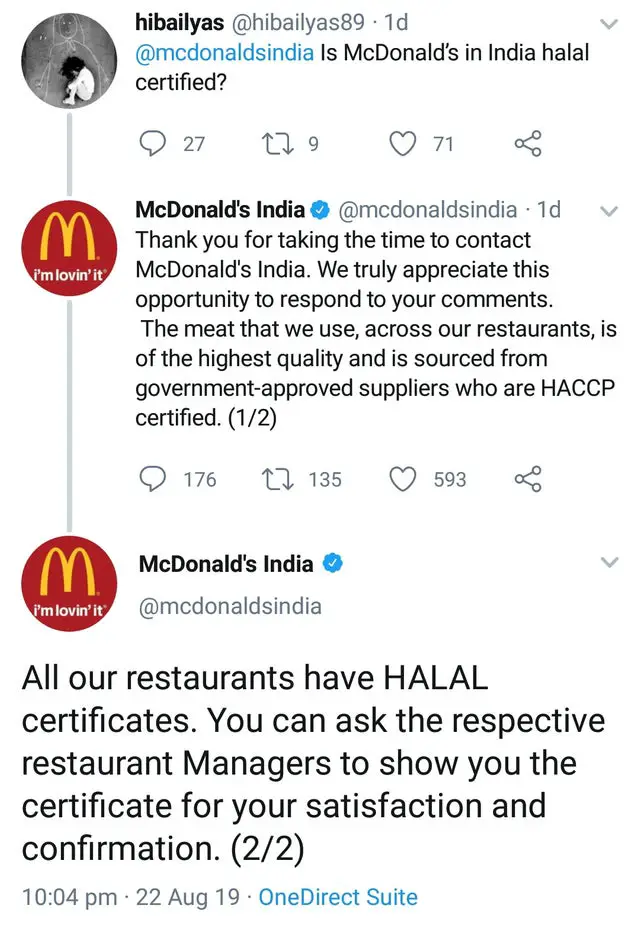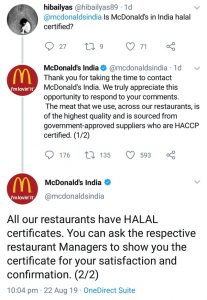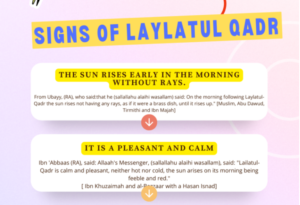
Sometimes I doubt if the uproar is because of how the meat is slaughtered or is it because the method of slaughter is accordance to Islamic law.Had the animal been slaughtered according to Jewish law, i.e. the exact same method of slaughter (cutting the jugular vein and letting the blood flow) nobody would care.
Some comment that caught my attention is –@tejinderbagga @BJP4India @BJP4Delhi Boycott McDonalds Go to Burger King / KFC etc the ones who use JHATKA Have volunteers standing outside McDonalds holding placards cautioning HINDUS about HALAL and requesting them to BOYCOTT !
— Bhasad-Zaroori-Hai (@nationalist1965) August 23, 2019
Why eat meat at all?
Why Muslims eat Halal Meat ?
Islam’s view on Animal Welfare
Allah has blessed human being with plenty of resources to meet their needs. He has been given options to utilize those resources rightly or wrongly. Food is one of the biggest needs of human life and its selection and processing varies between different regions, religions and cultures. Religion is the most powerful factor influencing the dietary patterns and habits.The Quran and guidance from Prophet Muhammad (upon whom be peace) give many examples and directives about how people should treat animals. Here are examples of such reports which instruct Muslims about kind treatment to animals: Reward for mercy: The Prophet, may God bless him and grant him peace, said, “Whoever is merciful even when slaughtering a sparrow, God will be merciful to him on the Day of Judgment.” (Al-Adab al-Mufrad, Al Bukhari)Under Islamic guidelines, as with Judaic, any undue pain for the animal must be avoided. It is forbidden to treat an animal cruelly during its lifetime or during the slaughter. If the animal is killed by a blow, strangling, electric shock or drowning in water, its meat is not considered permissible. Islamic practices dictate that the animal is not allowed to be put down in view of other animals neither is the knife to be openly shown to the animal to be slaughtered. This would cause the animals distress and is not best practice.It is unfortunate that People tend to view religious slaughter as incompatible with humaneness; quite the contrary is true – compassion and animal welfare stand at the centre of the entire process.kosher and Halal are not words commonly known by the public, but to Jewish and Muslim communities they are synonymous with sincerely held, religiously mandated care for animals. They refer to the Jewish and Muslim humane methods of slaughter of animals for food, and the body of religious law in which they are contained talks not only about the last two seconds of an animal’s life, but about its treatment from birth.There is much difference between shechita (kosher method)and zabiha (Halal method) , but both quickly dispatch the animal by severing the structures at the front of the neck – the trachea, oesophagus, carotid arteries and jugular veins. When carried out by a trained practitioner, the speed and precision of the incision ensures the lack of stimulation of the severed structures and results in the immediate loss of consciousness; blood flow to the brain is completely halted. In addition, blood empties rapidly from the brain.Irreversible cessation of consciousness and insensibility to pain are achieved, providing the most effective stun. There is no delay between stun and subsequent death, so the animal cannot regain consciousness – as can happen with conventional slaughter methods.Traditional Non Halal methods of stunning by use of a captive bolt, gassing or electrocution (by electrified pincers for larger animals, or a water bath with an electric current running through it for poultry) paralyse the animal, and it is unable to display outward signs of feeling pain. However, it is impossible to know whether the animal is feeling pain or not.There is ample scientific evidence that religious slaughter is at least as humane as conventional mechanical slaughter. Research in the UK and the US, including by Dr Temple Grandin – one of the authorities on animal welfare – have supported this view. By contrast, many of the studies that suggest that religious slaughter causes unnecessary pain have been agenda-driven and methodologically flawed, stretching data in a distinctly unscientific fashion to unsupported conclusions.Similarly, the European Food Safety authority found in 2004 that the failure rate for the much-trumpeted penetrating captive bolt stunning in conventional mechanical slaughter may be as high as 6.6%, and up to 31% for non-penetrating captive bolt and electric stunning. This equates to millions of animals each year that experience incredible suffering. But the BVA has not mounted a campaign on this.There will always be a discussion about what can be learned from scientific evidence, and the Jewish and Muslim communities stand ready to debate in any constructive forum. But let us not pretend that religious slaughter represents a key battleground for animal welfare in this country – to do so is disingenuous in the extreme.The problem of stunning
Judaism expressly forbids stunning. Conversely whilst not being considered ideal, stunning, as long as it does not kill the animal in question, is acceptable in Islam. Nevertheless, there are some negative aspects of stunning an animal before it is slaughtered for human consumption. These are as follows:- Research shows that some animals and poultry die prior to slaughter due to stunning
- Stunning is inhumane to animals and causes unnecessary suffering and distress; there is a high frequency of animals being hit but not falling unconscious, causing further suffering to the animal
- Stunning prevents the drainage of the entire blood from the meat, risking the build-up of bacteria and disease When administered correctly, ritual slaughtering causes a sudden drop in blood pressure to the brain which renders the animal brain dead within seconds. Many researchers have found this method to be less painful than modern methods of slaughter but opinions are wide and varied. The method is considered to keep the meat fresh and free from impurities.
McDonald a Halal funding goes to terrorist ?
Look at this tweet-This is what I call an extreme level of ignorance . McDonald’s is the world’s largest restaurant chain by revenue, serving over 69 million customers daily in over 100 countries across 37,855 outlets as of 2018.McDonald’s restaurants are found in 120 countries and territories around the world and serve 68 million customers each day.McDonald’s operates 37,855 restaurants worldwide, employing more than 210,000 people as of the end of 2018.There are currently a total of 2,770 company-owned locations and 35,085 franchised locations, which includes 21,685 locations franchised to conventional franchisees, 7,225 locations licensed to developmental licensees, and 6,175 locations licensed to foreign affiliates.For the fiscal year 2017, McDonalds reported earnings of US$5.2 billion, with an annual revenue of US$22.8 billion .Just Imagine if it would have been funding terrorist!U morons….. Why u r offending my religion? I want Jhatka Certified meat only. Why u r forcing halal on us? Halal gives very painful death to animal. Halal funding goes to terrorists.#boycottmcdonalds
— शैलेंद्र Shailen🇮🇳 (@shailen_pratap) August 23, 2019
Conclusion-
By the Way I haven’t written this article because I am a McDonalds fan infact I avoid all sort of fast food.I am writing this article to support my innocent brothers and sisters in their schools and Colleges who face allegations and questions just because they are Muslims . In this era of Islamophobia we need to be well informed .If you found this article useful,consider sharing it with people who may benefit from it .Jazak Allah Khair.Reference :
- theguardian.com/commentisfree/2014/mar/06/jewish-muslim-slaughter-animal-welfare-humane
- wikipedia.org/wiki/McDonald%27s
- twitter.com/mcdonaldsindia/status/1164584030647377920
Discover more from Islam Hashtag
Subscribe to get the latest posts sent to your email.





